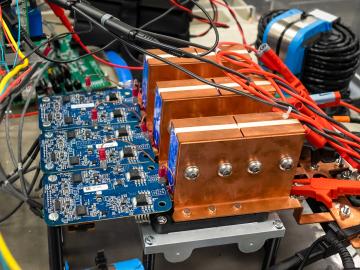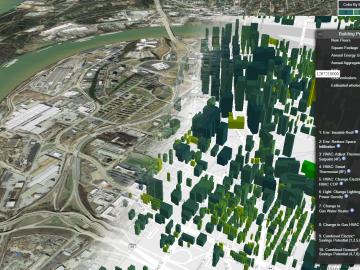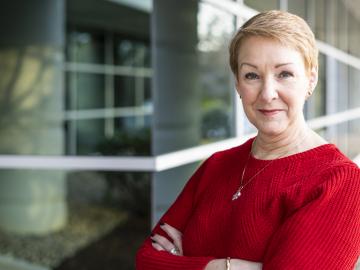
Filter News
Area of Research
- Advanced Manufacturing (3)
- Biology and Environment (15)
- Computational Engineering (1)
- Computer Science (2)
- Energy Science (31)
- Fuel Cycle Science and Technology (1)
- Fusion and Fission (11)
- Fusion Energy (1)
- Isotope Development and Production (1)
- Isotopes (3)
- Materials (29)
- Materials for Computing (4)
- National Security (13)
- Neutron Science (11)
- Nuclear Science and Technology (8)
- Quantum information Science (1)
- Supercomputing (38)
News Type
News Topics
- (-) Biomedical (17)
- (-) Chemical Sciences (35)
- (-) Computer Science (63)
- (-) Grid (16)
- (-) Machine Learning (13)
- (-) Nuclear Energy (28)
- (-) Space Exploration (3)
- 3-D Printing/Advanced Manufacturing (48)
- Advanced Reactors (12)
- Artificial Intelligence (35)
- Big Data (8)
- Bioenergy (25)
- Biology (26)
- Biotechnology (10)
- Buildings (15)
- Clean Water (2)
- Composites (12)
- Coronavirus (17)
- Critical Materials (11)
- Cybersecurity (17)
- Education (3)
- Element Discovery (1)
- Energy Storage (43)
- Environment (38)
- Exascale Computing (13)
- Fossil Energy (1)
- Frontier (16)
- Fusion (17)
- High-Performance Computing (32)
- Isotopes (20)
- ITER (2)
- Materials (60)
- Materials Science (56)
- Mercury (2)
- Microelectronics (1)
- Microscopy (17)
- Molten Salt (3)
- Nanotechnology (29)
- National Security (18)
- Neutron Science (54)
- Partnerships (31)
- Physics (26)
- Polymers (13)
- Quantum Computing (13)
- Quantum Science (31)
- Security (12)
- Simulation (10)
- Statistics (1)
- Summit (22)
- Transportation (26)
Media Contacts

Analytical chemists at ORNL have developed a rapid way to measure isotopic ratios of uranium and plutonium collected on environmental swipes, which could help International Atomic Energy Agency analysts detect the presence of undeclared nuclear

Pengfei Cao, a polymer chemist at ORNL, has been chosen to receive a 2021 Young Investigator Award from the Polymeric Materials: Science and Engineering Division of the American Chemical Society, or ACS PMSE.

ORNL has licensed its wireless charging technology for electric vehicles to Brooklyn-based HEVO. The system provides the world’s highest power levels in the smallest package and could one day enable electric vehicles to be charged as they are driven at highway speeds.

A new tool that simulates the energy profile of every building in America will give homeowners, utilities and companies a quick way to determine energy use and cost-effective retrofits that can reduce energy and carbon emissions.

Joseph Pickel has been elected a 2021 fellow of the American Chemical Society, or ACS. Pickel supports the Fusion and Fission Energy and Sciences Directorate as environment, safety and health

Kathy McCarthy, associate laboratory director for Fusion and Fission Energy and Science at the Department of Energy’s Oak Ridge National Laboratory, has been elected fellow of the American Nuclear Society for her nationally and internationally recognized leadership in nuclear energy and fusion.

The Department of Energy’s Oak Ridge National Laboratory has licensed its award-winning artificial intelligence software system, the Multinode Evolutionary Neural Networks for Deep Learning, to General Motors for use in vehicle technology and design.

The U.S. Department of Energy’s Innovative and Novel Computational Impact on Theory and Experiment, or INCITE, program is seeking proposals for high-impact, computationally intensive research campaigns in a broad array of science, engineering and computer science domains.

Using complementary computing calculations and neutron scattering techniques, researchers from the Department of Energy’s Oak Ridge and Lawrence Berkeley national laboratories and the University of California, Berkeley, discovered the existence of an elusive type of spin dynamics in a quantum mechanical system.

A rare isotope in high demand for treating cancer is now more available to pharmaceutical companies developing and testing new drugs.


